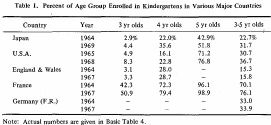| Home > Policy > White Paper, Notice, Announcement > White Paper > EDUCATIONAL STANDARDS IN JAPAN 1971 > CHAPTER |
||
In the U.S.A., England and Wales and West Germany, as in Japan, pre-school education is provided in two types of functionally different institutions, i.e. kindergartens and nursery schools. (In England and Wales institutions usually called kindergartens arc called nursery schools). In France, kindergartens perform the functions of both types of institution. In the U.S.S.R., nursery schools designed for children between two months and three years of age and kindergartens designed for children of three to six years of age from unified pre-school educational institutions called "nursery school kindergartens."
Institutions of pre-school education are under the supervision of two kinds of authorities in the U.S.A. and England and Wales: state education authorities and welfare authorities in the former, and the Department of Education and Science and the Department of Health in the latter. On the other hand, in the Federal Republic of Germany supervision is under one authority, the Department of Social Welfare. In the U.S.S.R. also, one authority, the Ministry of Education, supervises the instructional activities in pre-school educational institutions. In the United Kingdom, however, there is a movement toward shifting the supervision of education for children of three years of age and over to the Department of Education and Science Moreover, in West Germany, where pre-school education has been provided as part of social welfare services, efforts have recently been made to treat kindergartens as educational institutions.
A comparison of enrollment ratios of kindergartens in various major countries shows that the enrollment ratio of five-year old children is highest in France, followed by the U.S.A. and Japan. (In England and Wales, compulsory education starts from five years old.) However, ratios are generally high in all the countries, and they are on the increase. In France, the enrollment ratio is as high as 99%, although pre-school education is not compulsory. This high ratio may be attributable to the fact that the government pays 100% of teachers' salaries and takes measures to assist in the provision of facilities and equipment so as to enroll all children who so desire.

Note: Actual numbers are given in Basic Table 4. Basic Table 4
Next, it is to be noted that in Japan approximately three-fourths of the total enrollment in? Kindergartens are in private kindergartens, whereas in the United Kingdom, the U.S.A. and France, the proportions of enrollment in public kindergartens are very high, being 90%, 70% and 60% respectively. However in the Federal Republic tic of Germany, private kindergartens enroll 80% of all kindergarten children.
In addition to the pre-school programs described above, attempts have recently been made to improve the educational environments of pre-school children in the U.S.A., England and Wales and the Federal Republic of Germany, aiming at equal educational opportunities. In the U.S.A. at the pre-school level, early childhood programs called "Head Start" have been in practice since 1965 for the purpose of giving a head start on education to children who, coming from poor families, are educationally disadvantaged. In this way they may start their elementary education at the same level as children from normal families. As Of 1968,more than 2,000,000 pre-school children were participating in these programs.
In England and Wales, nursery facilities are being expanded as part of the Urban Program, for the purpose of extending education to pre-school children from poor families in urban slum areas.
In the Federal Republic of Germany, special institutions called "Schulkindergarten" (school kindergartens) aim at enrolling children who are intellectually backward due to their families' economic situation, etc., one year earlier than ordinary children.
| Back to Top | MEXT HOME |